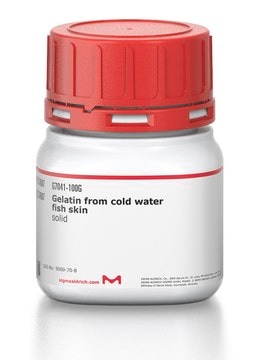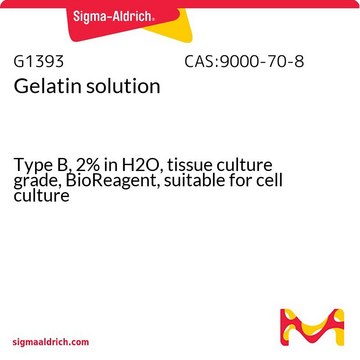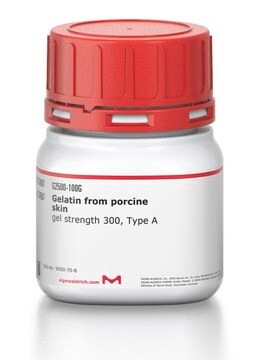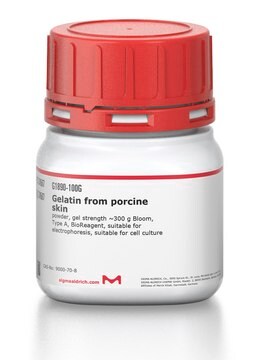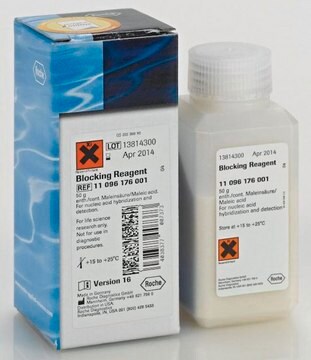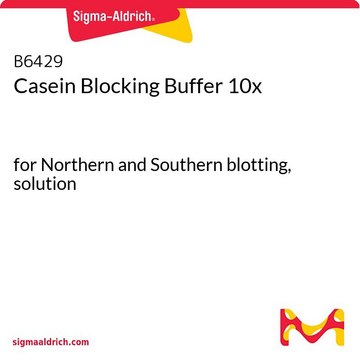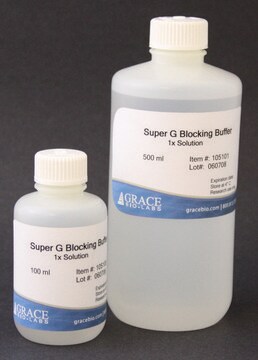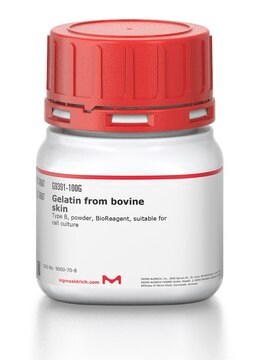G7663
Gelatin blocking buffer
for Western blotting, powder blend
Synonym(s):
blocking buffer
Sign Into View Organizational & Contract Pricing
All Photos(1)
About This Item
UNSPSC Code:
41105300
NACRES:
NA.25
Recommended Products
General description
Gelatin Blocking Buffer is a standard reagent in Western blotting procedures. It is used to block non-specific binding on the membrane, when using nylon or nitrocellulose (but not PVDF).
Application
Suitable for use as a non-specific blocking agent for Western blots.
Reconstitution
Dissolve entire contents of the bottle in a final volume of 1L molecular biology grade water. The resulting solution will be faint yellow in color and does not require filtering or heating before use.
Related product
Product No.
Description
Pricing
Storage Class
11 - Combustible Solids
wgk_germany
WGK 1
flash_point_f
Not applicable
flash_point_c
Not applicable
Certificates of Analysis (COA)
Search for Certificates of Analysis (COA) by entering the products Lot/Batch Number. Lot and Batch Numbers can be found on a product’s label following the words ‘Lot’ or ‘Batch’.
Already Own This Product?
Find documentation for the products that you have recently purchased in the Document Library.
Customers Also Viewed
A Fortin et al.
Biochemistry and cell biology = Biochimie et biologie cellulaire, 72(5-6), 239-243 (1994-05-01)
The major advantages of the horseradish peroxidase chemiluminescence (HRP-CL) immunodetection method in Western blot analysis are its high sensitivity, nonradioactive detection, economy of the primary antibody, and speed of detecting the signal. However, we observed a strong and reproducible signal
K A Brogden et al.
Infection and immunity, 67(8), 4256-4259 (1999-07-23)
Affinity-purified rabbit polyclonal (PAB96-1) and mouse monoclonal (1G9-1C2) antibodies to synthetic H-DDDDDDD-OH, an antimicrobial anionic peptide (AP) originally isolated from ovine pulmonary surfactant, were prepared and used to assess the concentrations of AP-like molecules in human respiratory tract samples. In
A sensitive cell-based assay for the detection of residual infectious West Nile virus.
Koldijk, M.H., et al.
Vaccine, 25, 39-39 (2007)
Raul Bettencourt et al.
Comparative biochemistry and physiology. Part A, Molecular & integrative physiology, 152(2), 278-289 (2008-12-02)
The interaction between microorganisms and host defense mechanisms is a decisive factor for the survival of marine bivalves. They rely on cell-mediated and humoral reactions to overcome the pathogens that naturally occur in the marine environment. In order to understand
Iram Liaqat et al.
Brazilian journal of microbiology : [publication of the Brazilian Society for Microbiology], 43(3), 969-980 (2012-07-01)
Enterotoxigenic Escherichia coli (ETEC) strains are leading causes of childhood diarrhea in developing countries. Adhesion is the first step in pathogenesis of ETEC infections and ETEC pili designated colonization factor antigens (CFAs) are believed to be important in the biofim
Protocols
An introduction to both Northern and Southern blotting, popular methods for the transfer of macromolecules to membranous support. This article also offers a Southern blot protocol and a northern blot protocol.
Our team of scientists has experience in all areas of research including Life Science, Material Science, Chemical Synthesis, Chromatography, Analytical and many others.
Contact Technical Service